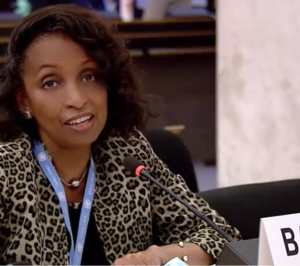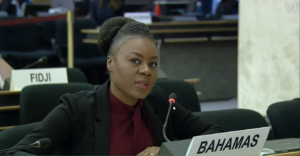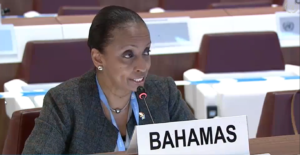Bahamas Participates in 45th Regular Session Of the Human Rights Council
On 14 September 2020, H.E. Keva L. Bain, Ambassador/Permanent Representative of The Bahamas to the United Nations Office and Other International Organizations in Geneva delivered a statement at the 45th Session of the Human Rights Council during an Enhanced Interactive Dialogue with the High Commissioner for Human Rights on the human rights implications of the COVID-19 pandemic. The Bahamas highlighted inter alia the challenges posed to States like The Bahamas of being unfairly categorised as “high income” when they are facing the triple threats of climate change, the COVID-19 pandemic and economic fallout. In direct response to The Bahamas’ intervention, the High Commissioner agreed that it is indeed an unfair situation when States, simply because of their success in industries such as tourism, are classed as middle or high income despite the fact that they face inherent vulnerabilities such as climate change and exogenous shocks that can quickly erode their development gains and plunge them into economic recession. The High Commissioner recalled that this was an issue with which the States of Latin America and the Caribbean have been grappling for a long time and regrettably there is still no solution. However the situation nevertheless needs to be reviewed by the international community. [Photo credit: UN Web TV]
On 17 September 2020, Mr. Frank Davis, Deputy Permanent Representative, Permanent Mission of The Bahamas to the United Nations Office and other International Organizations in Geneva, delivered a statement at the 45th Session of the Human Rights Council during the Biennial panel discussion on the Right to Development which was convened under the theme “COVID-19 and the right to development: we are all in this together”. The Bahamas highlighted that COVID-19 has exacerbated the inherent vulnerabilities of Small Island Developing States and further compounded the challenges already brought about by climate change and increased frequency of natural disasters, vulnerability to exogenous shocks and heavy indebtedness. Thus, it was underscored that nations such as The Bahamas require more favourable financing conditions which are not conditioned by skewed income per capita levels, as well as debt relief and grants to effectively address the economic impacts of the pandemic. [Photo credit: UN Web TV]
On 29 September 2020, Ms. Sasha Dixon, Second Secretary, Permanent Mission of The Bahamas to the United Nations Office and other International Organizations in Geneva, delivered two statements in support of the adoption of the Third Cycle Universal Periodic Review outcomes of Grenada and Kiribati, respectively. The Bahamas commended the continued efforts of both nations in the field of human rights, despite challenges faced as fellow Small Island Developing States (SIDS) including climate change and the impacts of the COVID-19 pandemic. Both countries were congratulated for their commendable work in addressing climate change and the international community was called upon to continue supporting the efforts of these countries in the field of human rights. [Photo credit: UN Web TV]
On 5 October 2020, H.E. Keva L. Bain, Ambassador/Permanent Representative of The Bahamas to the United Nations Office and Other International Organizations in Geneva, delivered a statement at the 45th Session of the Human Rights Council during the Council’s General Debate on Technical Assistance and Capacity-Building. The Bahamas took the opportunity to reaffirm the importance it attaches to ensuring that the Human Rights Council is fully diverse and inclusive, including through the Voluntary Technical Assistance Trust Fund to support the participation of Least Developed Countries and Small Island Developing States in the work of the Human Rights Council. The Bahamas conveyed that, despite its resource challenges, the country was pleased to become, in 2020, the first beneficiary donor to the Fund and the first donor from Latin America and the Caribbean. The Bahamas also recalled that its modest contribution represented the fulfilment of one of the country’s voluntary pledges and commitments in respect of its membership to the Human Rights Council. [Photo credit: UN Web TV]




